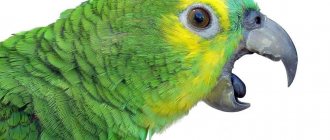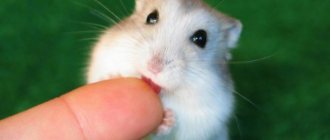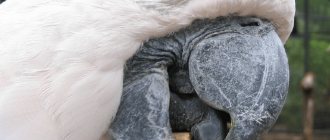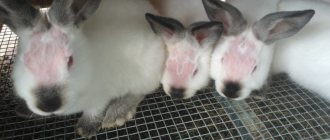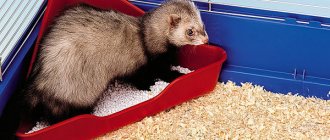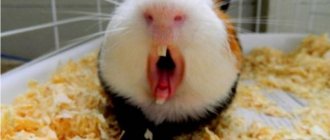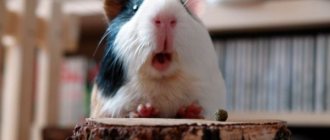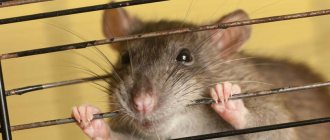Livestock » Ferrets
0
1598
Article rating
Kira Stoletova
Ferrets have long been transformed from wild predators into domestic pets. These small animals are kept in some homes like cats. The ferret catches mice, loves to play with people and can be trained to go to the litter box. But even the domesticated ferret breed, the ferret, is capable of biting or scratching its owner. In a single case, such behavior is not scary: the animal could simply experience a nervous shock and begin to defend itself. But how can you stop a ferret from biting if this has become the norm for a predator?
How to stop a ferret from biting
In this case, the cause of the aggression should be determined and a set of disciplinary measures should be taken. But at the same time, remember that you cannot punish the animal: ferrets are very vindictive, but they are still predators, albeit small ones.
Features of behavior of ferrets
Most often, the reason why a ferret bites is natural instincts. With the help of their teeth, cubs explore the world and learn to defend their territory.
The games of young horet in their natural habitat may seem harsh, but this is how they acquire hunting and self-defense skills. Aggression increases in young predators due to a surge in hormones. This usually occurs in the first month of their life. You should not get a second animal during this period of the ferret’s life: the young animals can cause real carnage. Adults can also show aggression, but in smaller numbers.
The male bites the female's withers during the hunt. Also, directly during mating, the ferret firmly holds the female by the withers with his teeth. In this place, the skin of predators is structured like that of cats, and strong bites do not harm them.
These animals prefer to kill their victims with a quick and powerful bite to the neck, so if a predator tries to grab an arm or leg or attacks from an ambush, it means that he sees you as a victim. Such behavior should be corrected immediately, otherwise the animal will have to be kept exclusively in a locked state.
Other reasons for ferret bites may include:
- active games that awaken hunting instincts in the animal;
- a change of scenery;
- distrust of strangers;
- struggle for power over territory.
Typically, the domestic ferret does not bite often, since this breed was specially bred to coexist peacefully with humans. But it should be remembered that even ferrets had wild predators as their ancestors, so natural instincts sometimes take over the animal.
Many people mistakenly believe that it is impossible to stop a ferret from biting at home, since the animal does not have intelligence. However, it is not. These predators are social animals that understand a lot. To wean an animal from showing aggression, a special set of measures should be taken, depending on the cause of the bites.
Reasons why dogs may bite
Depending on the age of the dog, the reasons for the unwanted behavior may be different. A dog is a predator, with teeth and claws, and expresses its emotions and feelings with the help of its mouth and teeth.
A puppy appears in a home on average between the ages of 1.5 and 3.5 months, at which time the dog’s teeth begin to change. Changing teeth is a slow process and very painful for the puppy. The puppy tries to relieve itching and pain in the gums by tasting all surrounding objects, including the owner’s hands and clothes. At a later age, from about 6 months, when the period of puberty begins, the young dog tries to establish its place in the owner’s family, tests its strength, its position in the pack.
An adult dog can bite for various reasons:
Fear. When a dog is afraid, the normal behavior is to try to defend itself by using its teeth. Animals, like people, have different personalities and different temperaments. In fear, for example, when receiving excessive punishment, a dog may bite, experiencing extreme stress. The survival mechanism comes into play, and the dog can seriously injure a person.
Aggressiveness. As has already been said, all developed animals are different in character, even puppies from the same litter have very different types of temperament. Stronger individuals can show aggression, with such an animal it is necessary to start training and obedience courses earlier - if time is lost, only an experienced dog handler can help extinguish the dog’s aggressiveness.
Pain. During illness or after an injury, when there is physical impact on a sore spot or organ, the dog instinctively tries to remove the source of pain and the only way it can achieve this is with its teeth. The stronger the pain, the stronger the bite will be. The slightest pressure and increased pain will cause the dog’s jaws to close more strongly on the limbs of the doctor or even the owner.
Nervous disorder or overexcitement. Nervous disorder is a painful condition that can be relieved after consultation with a veterinarian using medication.
Overexcitation may appear after a prolonged, very active game and, having played too much, the pet does not notice that it is causing pain.
Jealousy, desire to gain attention. A dog is a social animal and is very emotionally dependent on humans.
Often, when the owner's attention is completely focused on another animal or activity, the dog tries to redirect the owner's attention to itself using its teeth.
Desire to take possession of food. Food aggression is probably one of the most common types of aggression that many owners encounter. This behavior is absolutely natural for the animal, because nutrition is a dog’s basic instinct necessary for survival.
Lack of education. If a dog lives in human society, it is necessary to accustom it to certain rules that apply in the community. Dog training can begin as early as 3 weeks of age. This is an ideal option, but in any case, the sooner you start teaching your puppy the rules of behavior in society, the faster he will learn and feel more confident in different situations.
Wrong upbringing. An incorrectly selected method of raising a dog can only worsen the situation and lead to aggression in the pet, and aggressiveness will require serious adjustments with a dog handler.
Under no circumstances should you hit a dog. Loud screams and physical violence in almost 100% of cases will lead to aggression in the pet.
Methods for adjusting animal behavior
Do domestic ferrets bite? The first thing to note is that even in the wild, ferrets do not bite all the time.
In childhood, they are taught to calculate the strength of their bite by the female, who can firmly pat the puppy by the withers for bad behavior. In a home environment, this should be done by the pet owner or breeder. The animal can inflict its first serious bites after 4 weeks of life. Before this, the puppy’s jaws are still very weak. When a predator is one month old, its teeth are already quite sharp and its oral muscles are strong.
The animal may not realize that it is clenching its jaw too tightly if this is not explained to it in time. In adulthood, it will be almost impossible to stop a ferret from biting. Animals on large farms or with inexperienced owners can often show aggression because they were not taught how to behave in the first months of life.
Before you stop a young ferret from biting, you should determine the cause of the behavior, since the methods for correcting the behavior vary. In some situations you should give a stern reprimand, in others you should show affection.
Consequences of a bite
First of all, it is worth noting that bites from wild ferrets are dangerous not only due to damage to the skin, but also due to the introduction of infection into the body. The most serious disease is considered to be rabies. Without proper medical care, such infection is fatal. But you should also be careful with pets. If you are bitten by a ferret, avoid the following:
- When the animal has already closed its jaws, do not try to pull it away. This will encourage the animal to tighten its grip.
- Do not hurt your pet - you will only cause him to have a surge of aggression.
- If you bleed lightly after the bite, do not stop it. This way, foreign microorganisms are removed from the wound, which minimizes unpleasant consequences in the future (for example, infection).
- Do not bandage the wound too tightly, much less sew it up.
- Any manipulations to disinfect and prevent damage should only be performed by a doctor.
A person bitten by a ferret needs immediate medical attention.
Next, we’ll figure out what to do if you’re bitten by a ferret on your own before receiving medical help:
- To make the animal unclench its teeth, grab it by the nose with your fingers. If you have access to cold water, pour over the animal. If these methods do not help, insert a strong, blunt object into his mouth and use it to loosen his grip.
- After being bitten by a vaccinated animal, it is enough to wash the wound and treat it with an antiseptic. If the damage is deep, consult a doctor.
- If you are bitten by a wild ferret, dissolve a piece of toilet soap in 0.5 liters of water and rinse the wound for 5 to 15 minutes. An alkaline environment will reduce the risk of contracting rabies.
- For a shallow bite, lubricate the damaged area with an antibacterial agent and bandage with a sterile bandage.
- If you know the owner of the ferret that bit you, ask him what diseases the pet was vaccinated against.
Active games
The most common cause of biting is the ferret being excited and playful. Even domestic breeds love to hunt rodents, so active play can awaken the animal's predatory instincts.
This manifests itself as a constant attempt to jump on a person, attack from the side, or jumping in one place with a grunt. This is how young ferrets play with their relatives and try to play with their owner, in whom they see a parental figure.
How to stop a ferret from biting if the cause is agitated behavior? In this case, the methods of influencing the animal look like this:
- stop the game by loudly saying the word “No” or “No”;
- stop paying attention to the ferret for a while;
- put the animal in a cage for half an hour to calm it down.
Usually, these measures work well on young ferrets, allowing the naughty baby to come to its senses. If the animal continues to be aggressive, then you can lift it by the withers and shake it slightly. For a ferret, this procedure is harmless, but in a similar way, the female will calm down active cubs, and her instincts will take effect.
Under no circumstances should you hit or throw an animal. This can cause the ferret to become embittered and seek revenge. It’s better to hold him by the scruff of the neck for a few minutes and give him a stern lecture. A measured voice will calm a raging pet well and make it clear that it is better not to do this. If you are afraid of harming your ferret with such disciplinary actions, then watch the training video.
Change of habitual environment
In the first days after purchasing the animal, the ferret may experience nervous shock and react aggressively towards the owner. The animal is not yet accustomed to new smells, so it should be left alone for a few days and allowed to get used to it.
In this case, the manifestation of aggression is not a threat to the person. This is the animal’s self-defense mechanism, which works in any unclear situation.
If the animal is nervous, it is better to let it come to its senses. During feeding and playing, you should call the animal by name and talk to it affectionately.
After a couple of weeks, the animal will get used to the new living conditions and will not bite. Sometimes the ferret shows aggression when the situation changes. For example, during renovations or simply moving furniture. This is also a natural process for the animal: in nature, pets are extremely jealous of their burrows and do not tolerate change. You can distract the predator with tasty food or a new toy.
Attack from around the corner
Sometimes a ferret can attack the owner or other household members and bite the legs on the sly. This is something different than biting your hands while playing. This is a bad habit. It is urgent to get rid of it, but it is not too easy.
It is recommended to use one method. You need to stock up on two sprays; they can be purchased at pet stores. One should have a bitter taste that is unpleasant for the ferret, the second should be sweet, which can be used as a treat for the animal.
Feet should be sprayed with bitter spray. When the ferret tries to bite, it will be unpleasant for him. Immediately after the incident, apply a sweet spray to some area of the body (for example, the palm) and offer the ferret to lick it. It is important that the animal feels the contrast, then it will gradually come to understand: biting is unpleasant, bitter, but if you lick it, you can feel a pleasant taste. Gradually, the ferret will wean itself from biting its legs.
Fear of man
If the ferret does not trust its owner, you should be patient. You need to monitor the behavior of the animal: if the animal often screams, jumps into the far corner of the cage, or has a fluffed tail, the animal is afraid of you.
It is possible to gain your ferret's trust, but the process will take some time. First of all, the conditions of detention should be reviewed. Animals do not tolerate loud noises and strong odors very well. There should be no speakers, TV or radio near the cage. It is important to avoid spraying air fresheners near the predator’s home. Aggressive chemistry can cause a ferret to become nervous.
You need to gradually accustom your ferret to being handled. You should not make sudden movements or try to pick up the ferret against its will. First of all, you can start giving the animal food from your hands. This way the ferret will get used to the smell of a person more quickly. However, it is better to wear strong gloves in the first days, since the animal is still capable of biting an owner who is unfamiliar to it.
You need to comb and stroke the animal more often when it allows. Ferrets really appreciate being treated well. You should not punish the animal physically: if the ferret bit you out of fear, then punishment will only push him away even more.
You can lubricate your hands with a bitter infusion of herbs so that it is unpleasant for your pet to bite them. This method is often used by experienced breeders.
You should not constantly use gloves when working with animals. The ferret will get used to the fact that the skin does not feel pain and it will be almost impossible to stop him from biting.
What not to do, common mistakes of beginners
- Bit and got it in the nose. Yes, it also happens that after each bite the owner clicks the nose of his “offender” in the hope that because of this he will stop biting, as they say “they knock out a wedge with a wedge.” I would not recommend doing this, because... any exaggeration of the force of the click can cause injury and nosebleeds, because this is one of the most sensitive and weak points of the domestic ferret. You will not achieve anything with this method; on the contrary, the animal may lose trust in you, and such actions may anger it. Any use of physical force for educational purposes is unacceptable; in this way, you will raise an angry, distrustful and aggressive animal, and not a white and fluffy pet.
- The ferret bites - I'll wear thick gloves. Another common misconception. Will you be wearing gloves all your life when interacting with animals? What you need to look for is not resistance to the ferret's teeth, but, on the contrary, teaching him to use them with reasonable force. He won’t bite through thick gloves, maybe, but he will understand that no matter how hard he bites, he won’t cause you pain. But he can bite not only your hand, but also your heel (another favorite place), what then, will you wear felt boots?
Hierarchy of animals in the house
Sometimes ferrets bite hard if they want to compete for power, like dogs or cats. The pet has good intelligence and can test how far it will be allowed to go. Most often, such behavior can be observed in young ferrets from 3 to 6 months.
How to stop a ferret from biting if he is fighting for leadership in the house? An effective method against such behavior is a combination of punishments and rewards. If the ferret behaves well and reacts to prohibitions, then you should give him a treat or let him walk around the apartment. In case of increased aggression, the animal should be locked in a cage or shaken by the scruff of the neck.
